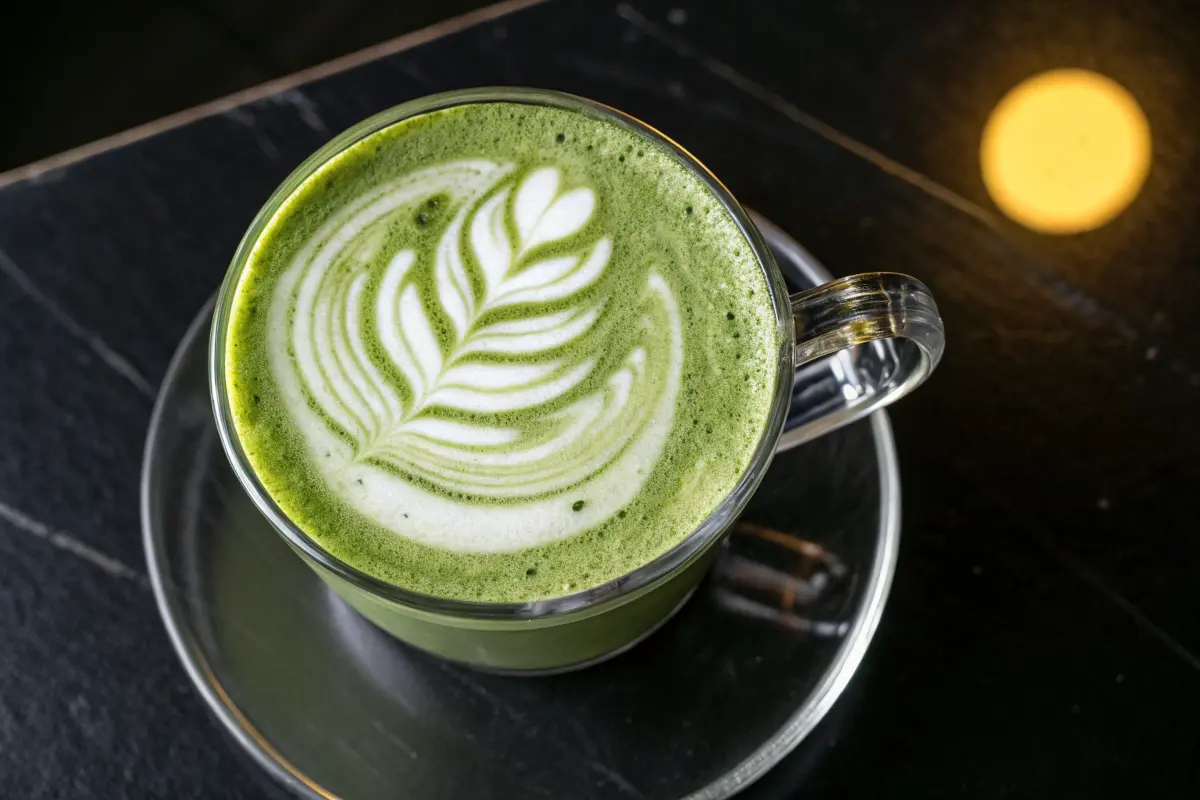Introduction: Does Matcha Contain Caffeine?
If you’re wondering does matcha contain caffeine, the answer is yes. Matcha, a powdered form of green tea, is naturally caffeinated. However, it offers a very different energy boost compared to coffee or regular tea. While matcha provides caffeine, it also contains L-theanine, an amino acid that promotes calmness and focus. This combination allows matcha to deliver sustained energy without the crash that often comes with coffee.
Table of contents
- Introduction: Does Matcha Contain Caffeine?
- How Much Caffeine Is in Matcha?
- Why Does Matcha Provide a Different Energy Boost?
- Does Matcha Offer Benefits Beyond Caffeine?
- How to Include Matcha in Your Daily Routine
- What Makes Matcha’s Caffeine Unique Compared to Other Drinks?
- Why Matcha Is More Than Just a Trend
- How Matcha’s Caffeine Can Fit Into Your Lifestyle
- How to Get the Most Out of Matcha’s Caffeine Benefits
- Is Matcha Right for Everyone?
- FAQs About Matcha and Caffeine
- Conclusion: Is Matcha the Right Choice for You?
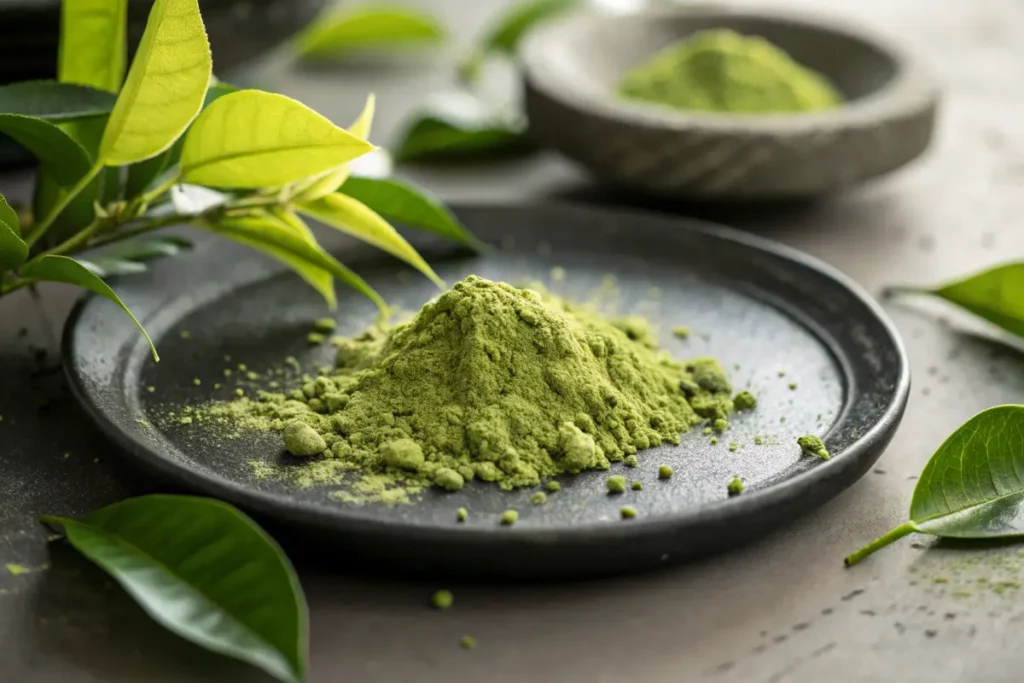
In this article, we’ll explore how much caffeine is in matcha, how it compares to other caffeinated drinks, and what makes it unique. Whether you’re considering a coffee alternative or curious about matcha’s benefits, understanding its caffeine content can help you make an informed decision.
How Much Caffeine Is in Matcha?
Matcha contains a moderate amount of caffeine, making it a balanced choice for those seeking a steady energy boost. Typically, a single serving (about one teaspoon) of matcha has between 30 and 70 milligrams of caffeine.
H3: Does Matcha Have More Caffeine Than Coffee?
Although matcha contains caffeine, it has less than coffee. On average, a cup of coffee contains about 95 milligrams of caffeine, while matcha provides around 35 milligrams per serving. However, matcha delivers a smoother, more sustained energy boost thanks to L-theanine, which moderates caffeine absorption.
- Coffee: Quick energy spike with a higher chance of a crash.
- Matcha: Smooth, steady energy without jitters or crashes.
When compared to green tea, matcha has more caffeine because it uses the whole tea leaf in powdered form, making it more concentrated.
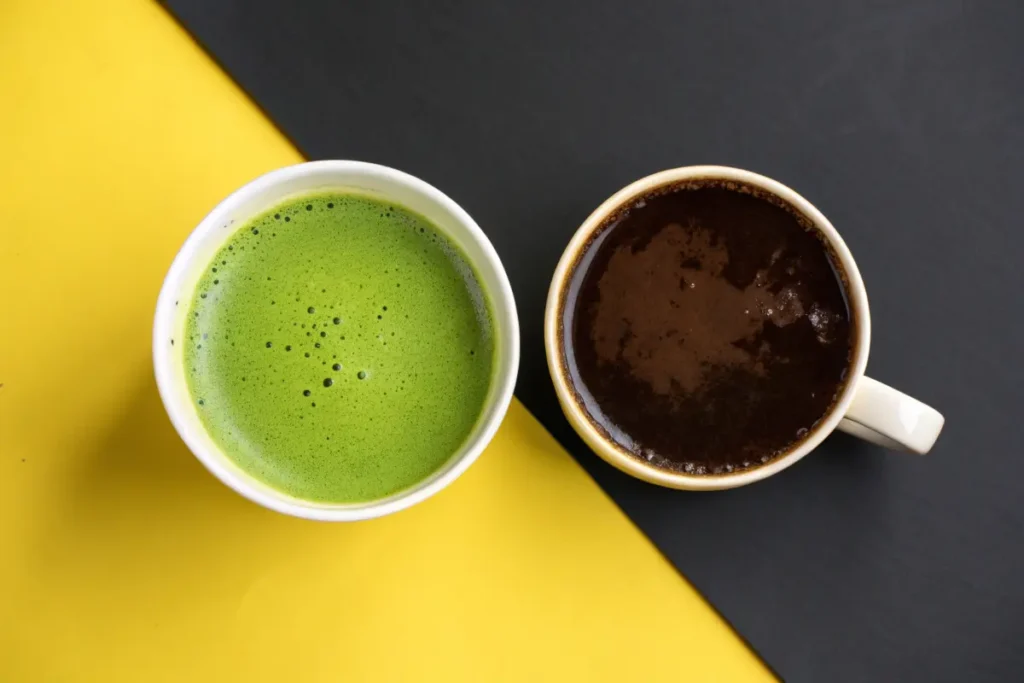
What Factors Impact Matcha Caffeine Levels?
The amount of caffeine in matcha can vary based on several factors:
- Serving Size: Larger servings naturally contain more caffeine. For instance, a traditional serving (1 teaspoon) has about 35 milligrams.
- Quality of Tea Leaves: Ceremonial-grade matcha, made from young tea leaves, typically contains higher caffeine levels than culinary-grade matcha.
- Brewing Style: Using more powder or hotter water can extract more caffeine during preparation.
Understanding these factors will help you adjust your matcha to suit your caffeine needs.
Why Does Matcha Provide a Different Energy Boost?
If you’re asking does matcha contain caffeine, it’s also worth understanding why matcha’s energy feels different. The unique combination of caffeine and L-theanine creates a calm yet focused boost of energy that stands apart from coffee or black tea.
Matcha’s Caffeine and L-Theanine Balance
Matcha’s caffeine levels work in harmony with L-theanine, a compound that slows caffeine absorption and reduces its intensity.
- How it works: L-theanine helps reduce stress while enhancing focus and mental clarity. This prevents the rapid spikes and crashes often associated with coffee.
- Why it’s unique: This balance makes matcha an ideal choice for people looking for smooth, sustained energy, especially during tasks requiring focus.
Can Matcha Replace Coffee in Your Routine?
Yes, matcha can easily replace coffee, thanks to its moderate caffeine content and steady energy release.
- Morning matcha: Start your day with matcha instead of coffee for sustained energy without the crash.
- Afternoon pick-me-up: Replace your second cup of coffee with matcha to avoid overloading on caffeine late in the day.
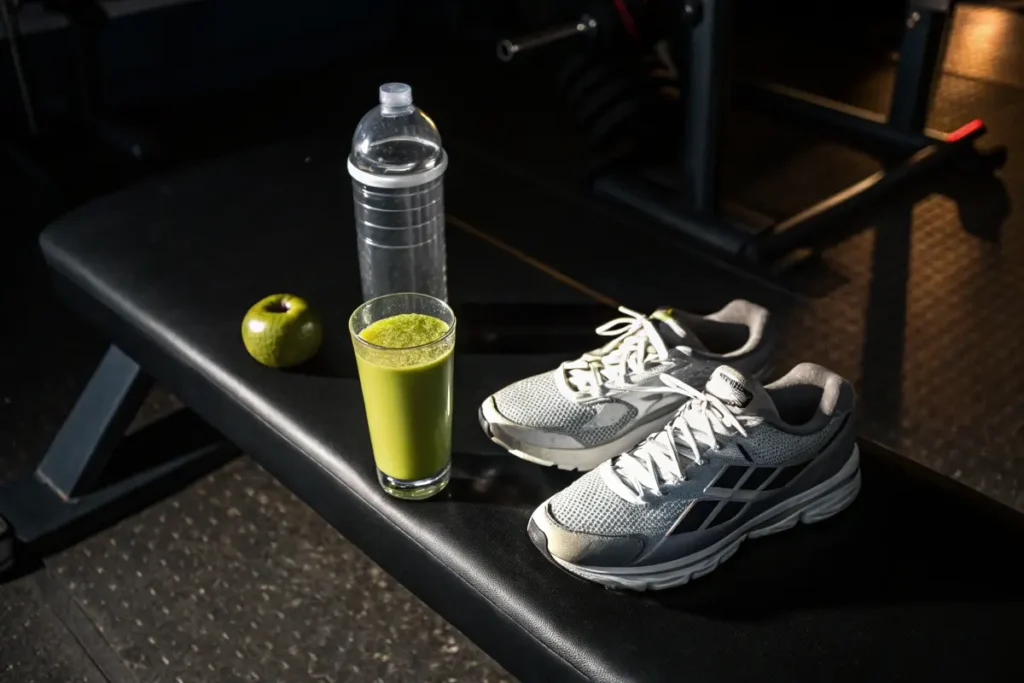
For those who are sensitive to caffeine, matcha provides a gentler alternative that still keeps you energized and focused.
Does Matcha Offer Benefits Beyond Caffeine?
Beyond its caffeine content, matcha is a nutrient powerhouse. It provides a range of health benefits, including antioxidants, metabolism support, and enhanced focus.
How Matcha’s Antioxidants Boost Health
Matcha contains high levels of antioxidants, particularly catechins, which help protect your body from free radicals. The most potent of these is EGCG (epigallocatechin gallate), known for its powerful health benefits.
- Why it matters: Antioxidants fight oxidative stress, which can cause aging and disease.
- Matcha vs green tea: Because matcha uses the whole tea leaf, it contains up to 137 times more antioxidants than a regular cup of green tea.
By drinking matcha regularly, you can support your body’s defense against damage while also enjoying its caffeine benefits.
Can Matcha Help With Weight Management?
Yes, matcha’s combination of caffeine and catechins can boost metabolism and help with fat burning.
- How it works: Catechins promote thermogenesis, a process where your body burns calories to produce heat. Meanwhile, caffeine increases energy expenditure and fat oxidation.
- Why it helps: Matcha is low in calories and makes a healthy substitute for sugary drinks like sodas or flavored lattes.
By pairing matcha with a balanced diet and regular exercise, you can use it to support your weight management goals.
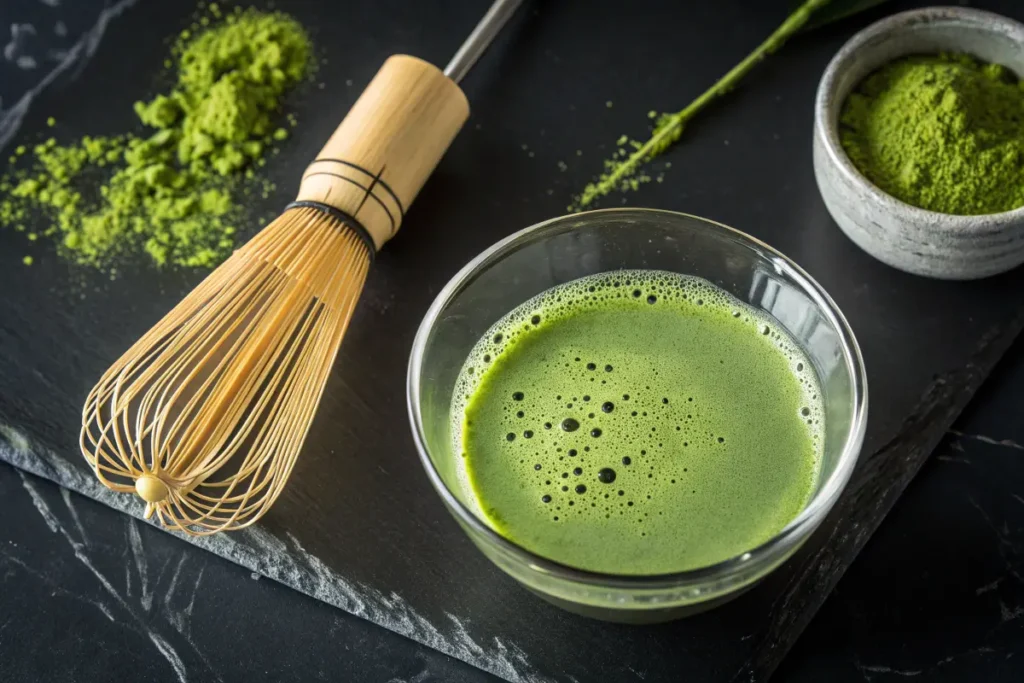
How to Include Matcha in Your Daily Routine
If you want to enjoy the benefits of matcha’s caffeine content, it’s important to prepare it properly. Fortunately, matcha is versatile and easy to incorporate into your day.
Starting Your Day With Matcha
Matcha’s moderate caffeine levels make it a perfect morning drink. The traditional preparation highlights its earthy flavor and allows you to enjoy its benefits without adding unnecessary calories.
- Steps to prepare:
- Sift 1 teaspoon of matcha powder into a bowl.
- Add 2–3 ounces of hot water (not boiling).
- Whisk in a zigzag motion until frothy.
For beginners, start with a small serving to adjust to the taste and caffeine levels.
Creative Ways to Enjoy Matcha
If traditional tea isn’t your preference, there are many modern ways to enjoy matcha caffeine benefits.
- Matcha latte: Mix matcha powder with steamed milk for a creamy drink.
- Smoothies: Add matcha to smoothies for an antioxidant-rich energy boost.
- Baked goods: Use matcha in cookies, cakes, or energy balls for a fun twist.
These creative options make it easy to include matcha in your routine, whether you’re at home or on the go.
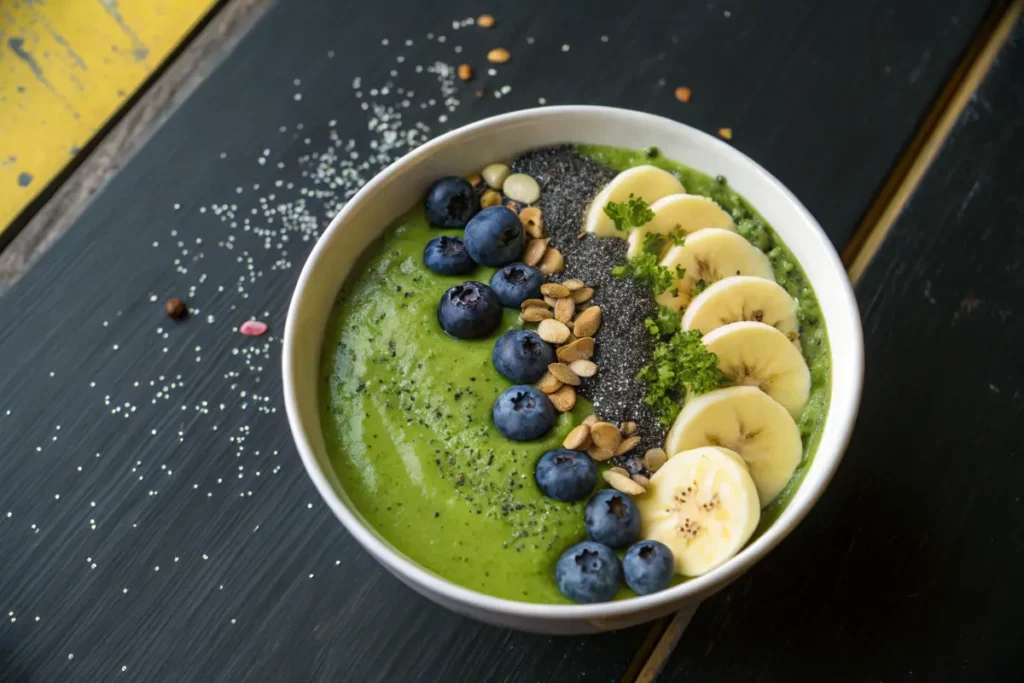
What Makes Matcha’s Caffeine Unique Compared to Other Drinks?
If you’ve been asking, does matcha have caffeine, it’s important to understand what sets it apart from other caffeinated beverages like coffee or black tea. Matcha delivers energy in a smoother, more focused way due to its unique chemical composition.
Matcha’s Calm Energy Boost
One of the reasons matcha stands out is its ability to provide calm energy. Unlike coffee, which often gives a jittery feeling, matcha promotes focus and mental clarity.
- Why it’s unique: Matcha contains L-theanine, an amino acid that works with caffeine to produce a balanced energy boost.
- How it works: L-theanine slows the absorption of caffeine in your body, resulting in sustained energy that can last for several hours.
For anyone looking for steady energy without the anxiety, matcha is the perfect solution.
How Does Matcha Compare to Energy Drinks?
Many people turn to energy drinks for an afternoon boost, but these often come with excessive caffeine and sugar. Matcha provides a healthier, more sustainable alternative.
- Energy drinks: Contain artificial ingredients and can lead to a quick spike in energy followed by a crash.
- Matcha: Offers a natural caffeine source and includes nutrients like antioxidants and amino acids that support your body.
Switching from energy drinks to matcha is a simple way to avoid unnecessary sugar while still enjoying a refreshing boost.
Why Matcha Is More Than Just a Trend
Although matcha is trendy, it has been valued for centuries due to its unique benefits. It’s not just a passing health fad—it’s a tradition deeply rooted in wellness.
Matcha’s Longevity in Japanese Culture
For over 1,000 years, matcha has been a part of Japanese culture, especially in the traditional chanoyu (tea ceremony). The ceremony emphasizes mindfulness and simplicity, reflecting matcha’s calming and centering qualities.
- Cultural relevance: Matcha was first used by Buddhist monks to stay alert during meditation. Its caffeine and L-theanine combination supported focus without overstimulation.
- Why it endures: Even today, matcha is seen as a drink that promotes physical and mental well-being, making it a timeless choice.
Matcha’s Rise in Global Wellness Trends
In recent years, matcha has gained global recognition for its health benefits and versatility. It’s now a popular choice for health-conscious individuals looking for a superfood that supports energy, focus, and metabolism.
- Modern uses: Matcha is now featured in cafes, fitness routines, and even skincare products.
- Why it resonates today: Matcha aligns with wellness trends like clean eating, mindfulness, and natural remedies.
Its ability to bridge the gap between ancient tradition and modern health needs has made matcha a staple in diets worldwide.
How Matcha’s Caffeine Can Fit Into Your Lifestyle
Whether you’re a busy professional, a fitness lover, or someone trying to build healthier habits, matcha’s caffeine can easily fit into your daily routine. Its gentle and steady energy boost makes it a great choice for a variety of lifestyles.
Matcha for Work and Focus

If you’re managing deadlines and meetings, matcha can be an excellent replacement for coffee. Its slow-release energy and focus-enhancing effects make it perfect for staying productive throughout the day.
- Morning boost: Start your morning with matcha to stay focused and tackle tasks that need your full attention.
- Afternoon energy: Swap your afternoon coffee for matcha to avoid the sluggish feeling that often comes after lunch.
By adding matcha to your workday, you can keep your energy and focus steady without worrying about a caffeine crash.
Matcha for Fitness and Recovery
Matcha isn’t just helpful for work—it’s also a great drink for people who exercise. Its nutrients and moderate caffeine can support both your workout performance and recovery.
- Before exercise: Drink matcha 30 minutes before your workout to improve your focus and endurance.
- After exercise: Matcha’s antioxidants can help ease muscle soreness and speed up recovery.
With its mix of natural caffeine and healthy nutrients, matcha is a perfect choice for an active lifestyle.
How to Get the Most Out of Matcha’s Caffeine Benefits
To maximize matcha caffeine benefits, it’s essential to prepare it properly and choose the right type of matcha for your needs.
Choosing the Best Matcha for Energy
Not all matcha is created equal. The grade and quality of matcha you use can impact its taste, caffeine content, and health benefits.
- Ceremonial-grade matcha: Ideal for drinking on its own. It’s made from the youngest tea leaves and has a vibrant green color.
- Culinary-grade matcha: Better for lattes, smoothies, and baked goods. It’s more affordable and works well when mixed with other ingredients.
For those looking to enjoy matcha primarily for its caffeine, ceremonial-grade matcha provides the purest energy boost.
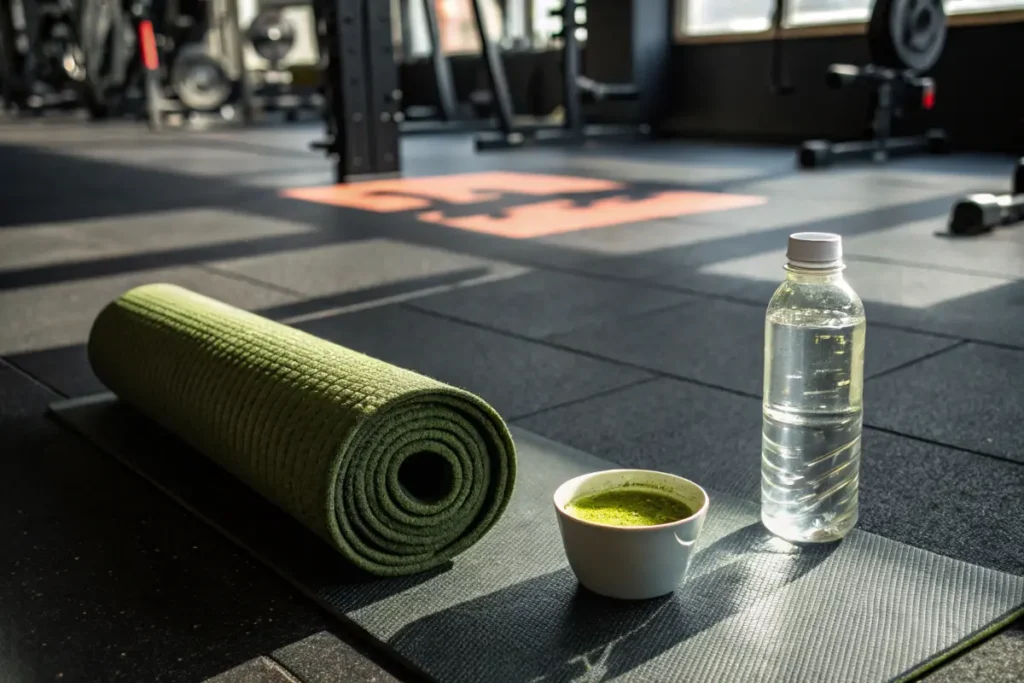
Tips for Making Perfect Matcha
The way you prepare matcha can also impact how much caffeine you consume and how enjoyable the drink is.
- Use the right temperature: Heat water to about 175°F (not boiling) to avoid bitterness.
- Experiment with ratios: Adjust the amount of matcha powder and water to find the strength that works for you.
- Try different methods: Use a bamboo whisk for traditional matcha or a frother for modern lattes.
These small adjustments can enhance both the flavor and the energy-boosting effects of matcha.
Is Matcha Right for Everyone?
While matcha offers many benefits, it may not be suitable for everyone. Consider your caffeine tolerance and health needs before incorporating matcha into your routine.
Matcha for Caffeine-Sensitive Individuals
If you’re sensitive to caffeine, you may wonder if matcha is the right choice for you. The good news is that matcha delivers a gentler energy boost compared to coffee, making it a viable option for many.
- Start small: Begin with half a teaspoon of matcha powder and gradually increase the amount as your body adjusts.
- Combine with food: Pairing matcha with breakfast or a snack can help reduce its intensity and prevent stomach upset.
Who Should Avoid Matcha?
Although matcha is safe for most people, there are some situations where caution is needed:
- Pregnancy or breastfeeding: Consult your doctor about caffeine limits during this time.
- Medical conditions: If you have certain health concerns, like anxiety or heart issues, check with a healthcare professional before drinking matcha regularly.
FAQs About Matcha and Caffeine
Yes, matcha does contain caffeine. A single serving of matcha (about 1 teaspoon) has around 30–70 milligrams of caffeine, depending on the quality and preparation method.
Matcha has less caffeine than coffee. A cup of matcha contains about 35 milligrams of caffeine, while a cup of coffee has around 95 milligrams. However, matcha’s energy boost lasts longer due to L-theanine.
Yes, matcha is stronger because it uses the entire tea leaf in powdered form. This makes it more concentrated and provides more caffeine and nutrients than steeped green tea.
Yes, matcha can be a great coffee alternative. It provides caffeine for energy but avoids the jitters and crashes often caused by coffee. The energy boost from matcha is smoother and longer-lasting.
No, matcha doesn’t cause a caffeine crash. Thanks to L-theanine, matcha slows the release of caffeine, giving you steady energy without sudden highs and lows.
The best time to drink matcha is in the morning or early afternoon. It can also be a great pre-workout drink for focus and endurance. Avoid drinking it late in the day to prevent interference with sleep.
Drinking too much matcha may cause side effects like restlessness or upset stomach due to its caffeine content. To avoid this, stick to one or two servings per day and drink it with food if you have a sensitive stomach.
Conclusion: Is Matcha the Right Choice for You?
In conclusion, matcha does contain caffeine, but its effects are different from those of coffee or energy drinks. Thanks to L-theanine, matcha provides a smooth, steady energy boost without the jitters or crashes that coffee often causes. Beyond caffeine, matcha is packed with antioxidants, supports metabolism, and can be a versatile addition to your diet.
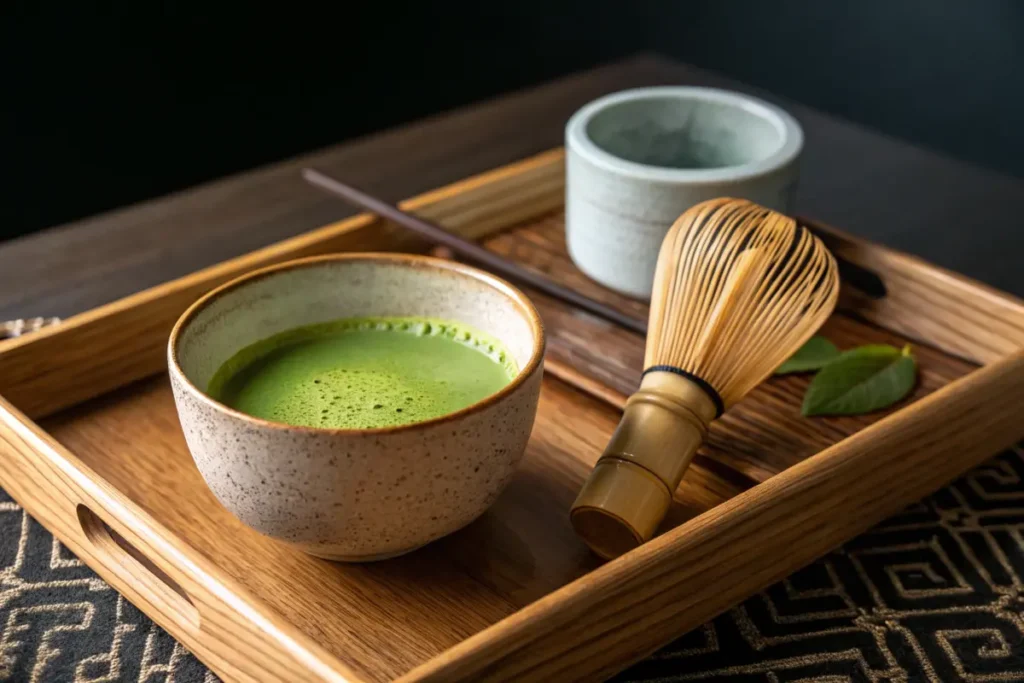
If you’re looking for a coffee alternative, matcha can be a great option. Its calming energy makes it perfect for mornings or as an afternoon pick-me-up. For comparison, you might want to learn why macchiato is so strong and decide which drink works best for your energy needs.
Matcha also fits well into a healthy lifestyle. If you’re curious about superfoods, consider pairing matcha with chia seeds. Chia seeds have their own benefits, including supporting gut health, as explained in what happens to your gut if you eat chia pudding. Plus, you can explore whether chia seeds are inflammatory to understand how both matcha and chia seeds contribute to overall wellness.
Ultimately, matcha is a versatile, nutrient-rich drink that can enhance your energy, focus, and overall health. Whether you enjoy it as a traditional tea, a latte, or in smoothies, matcha offers benefits that go beyond caffeine. Give it a try and see how this vibrant green superfood can fit into your daily routine!

